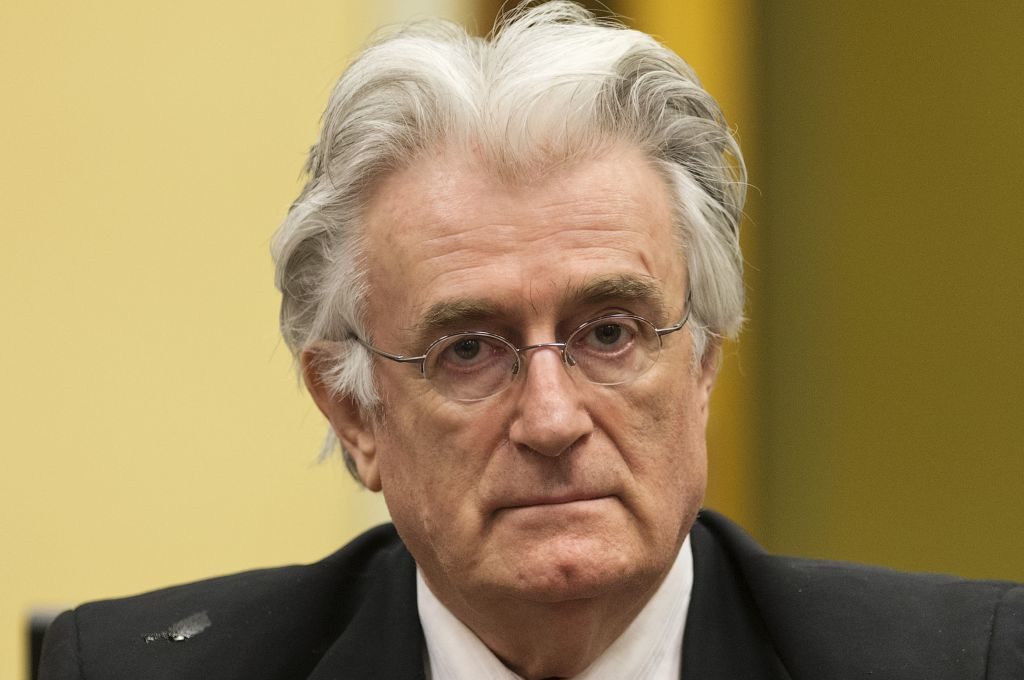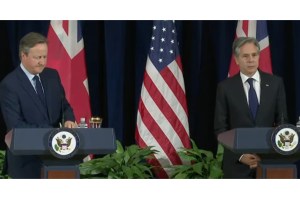Why is the Christchurch far-right terrorist obsessed with the crazy-haired Serb that the UN just sentenced to life in prison? How Balkan war criminals became idols to Western extremists is a bizarre story that shouldn’t be real, but is.
Twenty years ago this week, NATO decided to take Kosovo away from Serbia. The Rambouillet Agreement of March 18, 1999, named for the château outside Paris where negotiations failed to resolve that Balkan crisis without wider war, set the stage for an independent Kosovo under NATO administration and protection.
Five days after US, British, and Albanian delegations signed the Rambouillet Agreement – Serbian and Russian delegations refused to sign – NATO bombs started to fall on Serbia, and they kept falling for 78 days. The Kosovo War was a nearly bloodless affair for the Atlantic Alliance but not for the Serbs and Albanians.
NATO’s victory over Belgrade, achieved by airpower alone, made the Pentagon and associated think-tanks giddy. At last the age of truly high-technology war had arrived, rendering slogging it out in the mud with ground troops unnecessary. They forgot that NATO’s infantry in Kosovo was supplied by the tenacious Kosovo Liberation Army, determined to liberate their homeland from Serbian misrule. As a result, the US military invaded Iraq in 2003 carrying rucksacks filled with Balkan illusions about the magical power of technology in war and how easy foreign occupation can be when the locals sincerely greet you as liberators.
Neither were the West’s long-term costs here limited to the Middle East. For the Kremlin in particular, Kosovo represented a humiliation never to be repeated. Never again would Russia allow itself to be sidelined when Slavic Orthodox ‘brothers’ were being pummeled by NATO – a point Vladimir Putin has made many times over the last 20 years through clenched teeth. If Russia had the tough Putin rather than the boozy Boris Yeltsin in power in the 1990s, it’s difficult to see how NATO interventions in Kosovo or earlier in Bosnia could have happened at all.
That latter conflict is back in the news this week too. Today, the International Criminal Tribunal for the former Yugoslavia (ICTY: pronounced ‘ick-tee’ by Balkan cognoscenti) gave the hated Radovan Karadžić a life sentence for war crimes and genocide. The UN’s court in The Hague threw out an appeal by the 73-year-old Karadžić, the political leader of the Bosnian Serbs during Bosnia’s ugly 1992-95 war, and the sentence handed down today means the ardent Serbian nationalist will never see his homeland again.
Not that there’s much sympathy for Karadžić outside hardline Serbian nationalist circles. His once-fiery paeans to Serbdom and Orthodoxy have cooled with age and incarceration. While Ratko Mladić, the Bosnian Serb military leader in the war, inspired fierce loyalty from his troops – Mladić, too, has been sentenced to life behind bars by the ICTY – Karadžić and the pols around him were reviled for their wartime profiteering by Serbs serving at the frontlines.
Nevertheless, the Karadžić and Mladić sentences (the latter is appealing but that appeal is expected to be thrown out too) represent the end of the ICTY’s quarter-century run at dispensing justice for the bloody conflicts of the 1990s, what can be termed the wars of Yugoslav succession. Overall, the ICTY’s legacy is mixed. Although the court eventually sent away big fish like Karadžić and Mladić, that was at the end, and a lot of other big fish escaped justice. Even some who wound up in the dock, for instance top officials of Serbia’s sinister secret police, who had ample blood on their hands, inexplicably walked away free. Nevertheless, most Serbs consider the ICTY to be a kangaroo court biased against their nation, while many Croats view the court suspiciously too. These assessments seem unlikely to change anytime soon.
Westerners forgot about the Balkan mayhem of the 1990s long ago, and over the past couple decades a whole generation has come of age for whom mention of Srebrenica requires a Wikipedia check to grasp any meaning. Eclipsed by 9/11 and the longer wars that followed it, the unpleasant wars in Croatia, Bosnia, and Kosovo exist as historical footnotes in most NATO countries now, even though the political, economic, and cultural wounds inflicted by those nasty conflicts are far from healed.
Not all Westerners have forgotten, however. For a tiny minority, Balkan events linger as something of an obsession. On the fringes of the Left and Right, it’s not difficult to find Westerners eager to denounce NATO interventions of the 1990s as ‘neo-imperialism’ in identical terms – which also happen to closely resemble piquant Kremlin critiques of the recent Balkan wars.
Such a Balkan obsession appeared again with Brenton Tarrant, the 28-year-old Australian who murdered 50 innocents last Friday at two mosques in Christchurch, New Zealand. Although the exact ideology which motivated Tarrant’s terrorism spree is difficult to pin down beyond a generic far-right obsession with Muslims, demographics, and immigration, his 87-page manifesto offers many hints.
Its intellectual heft is lacking – a lot of the poorly organized thoughts of the personal trainer turned mass murderer are no more than shitposting – but what shines through is how much Tarrant admires Serbs. He played an infamous Serbian nationalist song from the 1990s – called ‘Remove Kebab’ on the far-right, it calls for killing ‘Turks’ and name-checks Radovan Karadžić – as background music for the snuff film he streamed online of his killing spree. Tarrant wrote the names of venerable Serbian heroes in the fight against the Ottomans on the rifle magazines he used to gun down Muslims at prayer.
Tarrant visited the Balkans in recent years in a quixotic hajj of sorts to honor his heroes in their centuries’ long fight against Ottoman rule, which he sought to emulate in some sinister fashion. Neither is this strange Serbophilia unique to Tarrant. Anders Behring Breivik, the Norwegian terrorist who murdered 77 people back in 2011, was likewise obsessed with the Balkans and their history of resisting Islam by force, which he viewed as a model.
It wasn’t just ancient history that Breivik found inspiring. He stated that his weird far-right ideology ‘was, in a way, imported from Serbia’ while viewing the Serbs who died under NATO bombing during the Kosovo War as ‘crusaders.’ For Breivik, NATO’s bombing of Serbia in the spring of 1999 was an outrage and ‘the straw that broke the camel’s back’ for him, leading to a path of violent mayhem.
Such self-styled Serbophilia represents for angry, maladjusted Westerners like Breivik and Tarrant a way to assemble a deeply anti-Muslim worldview without any taint of Nazism or anti-Semitism. Regardless, it’s profoundly ironic and disturbing that veneration of Radovan Karadžić seems to be rising among the West’s lunatic fringe just as the Serbs themselves are about to close the door on him and his doomed style of violence-prone hyper-nationalism.


















